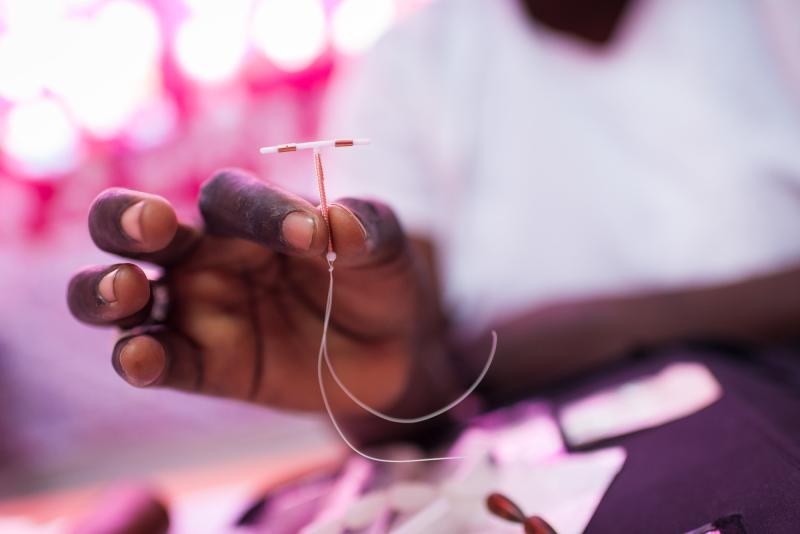Where We Work
See our interactive map


A health worker offers family planning counseling in Senegal, before the pandemic. Since COVID-19, more people are hesitant to visit health facilities, and many health workers in West Africa are concerned about a drop in access to services. Photo by Clément Tardif for IntraHealth International.
Demand for family planning doesn’t disappear during a pandemic.
As governments in francophone West Africa turn their focus to COVID-19 pandemic response, the already-limited number of qualified health workers is being reassigned to test and treat infected patients. As infection rates rise, many clients are beginning to see a trip to the health center as a potential health risk.
As a result, we’re already seeing the impact of COVID-19 on access to and use of family planning services.
So we have to adapt.
The Challenge Initiative (TCI) Francophone West Africa Hub is working closely with local partners and officials in West Africa to adjust in real time to COVID-19. This global project follows a business unusual model, in which francophone West African cities lead the way to increasing access to family planning in urban areas to ensure lasting, cost-efficient results. The hub is active in 11 cities across five West African countries and employs proven, high-impact interventions—including universal referrals and free family planning days—to reach women and girls with critical family planning services.
Now COVID-19 is threatening the region’s progress, and the health and future of millions of West Africans.
Here’s how we are meeting the challenge.
Through TCI’s “I Choose” communications campaign, we are broadcasting radio messages in local languages in five cities across Benin, Côte d’Ivoire, and Senegal. These messages highlight when and where women and girls can access family planning services and the benefits of these services.
Now we’re working with city stakeholders to adapt the campaign to include information on how to best prevent infection in health centers, including through social distancing, hand washing, and using personal protective equipment.
We’re training high-performing local health workers to coach community health workers and organize household visits, which help minimize large gatherings at health facilities. (TCI provides masks and gloves for health workers to wear during household visits.)
This also provides women who are unable or unwilling to visit a health center with family planning information, counseling, and infection-prevention guidance from a safe distance. Clients may collect their preferred contraceptive method directly from the health worker during the visit or, depending on their method choice, receive a referral to a nearby health facility.
Rosaline Faye, a community health worker in Ziguinchor, Senegal, notes that during the COVID-19 pandemic, “my colleagues and I, we are engaged more than ever at all levels of the health care system and we strongly urge women to continue to reach out to us for their family planning needs, even now.”
Through the hub’s flagship universal referral approach, every woman of reproductive age who visits a health center is asked about her familiarity with and desire to use family planning. If she’s interested, she can receive services the same day.
This saves women time and money and reduces their contact with others in transit and while at the health center.
The hub has trained health workers at nearly 750 facilities in universal referral and is now pivoting to conduct virtual trainings with even more.
We’re also training health workers to offer post-partum family planning, which offers women who deliver in a health facility the method of their choice. We’re expanding this to more facilities in Cotonou, Benin and Ouagadougou, Burkina Faso.
The Guttmacher Institute estimates that a 10% decline in the use of short- and long-acting reversible contraceptives could result in an additional 48 million women whose contraceptive needs are not met and an additional 15 million unintended pregnancies worldwide.
So local leaders need timely, accurate, and complete data—including localized changes in family planning utilization rates—to inform their decisions as they allocate scarce financial and human resources.
TCI is supporting country leadership by providing remote data collection and analysis coaching to city staff. We are already seeing the power of data to generate commitment and investment by local leaders.
The hub has trained health workers at nearly 750 facilities in universal referral.
The city of Abomey-Calavi, Benin, has committed to increase their investment in family planning by 25%.
“The Covid-19 pandemic caused a drop in the demand for family planning services due to a temporary low attendance at health centers,” says Souliyatou Bello, departmental head of maternal and child health, “but we will increase our investment during the second phase of our TCI-supported project and strengthen our focus on adolescents and young people, engaging pharmacies, private clinics, and school infirmaries to ensure continued family planning service provision.”
The pandemic has drastically reduced in-person meetings and workshops among family planning actors across francophone West Africa.
Eager to stay connected and provide a learning platform, we launched the francophone West Africa community of practice. It features an online, moderated discussion forum and periodic webinars with practical tips for cities and implementing partners on how to scale up high-impact interventions, including examples of successful adaptations to COVID-19.
The cities we support remain committed to increasing access to critical family planning services in their communities. But they face rising COVID-19 infection rates and uncertain challenges ahead.
As we continue to operate in this new normal, we maintain a singular focus: championing the health, well-being, and future of West African women and girls.
TCI works to sustainably scale up high-impact family planning interventions through four regional hubs, including the Francophone West Africa Hub, which is led by IntraHealth International and funded by the Bill & Melinda Gates Foundation.
Get the latest updates from the blog and eNews




